Bass amp is a powerful and convenient gear, coming in all shapes and sizes. Surely, a bass amp is a must-have for every single bassist.
But, Can you play an electric guitar through a bass amp? Yes, you can. A bass amp works for an electric guitar, too. Furthermore, many guitarists have used a bass amp while playing and recording.
If you just plug the guitar directly into the bass amp, you’ll get a dry sound, and you might not like what you hear. Therefore, you need to make some adjustments to help your electric guitar sound good and to get over the lack of effects that a bass amp provides.
Is It Bad To Play Guitar Through A Bass Amp?
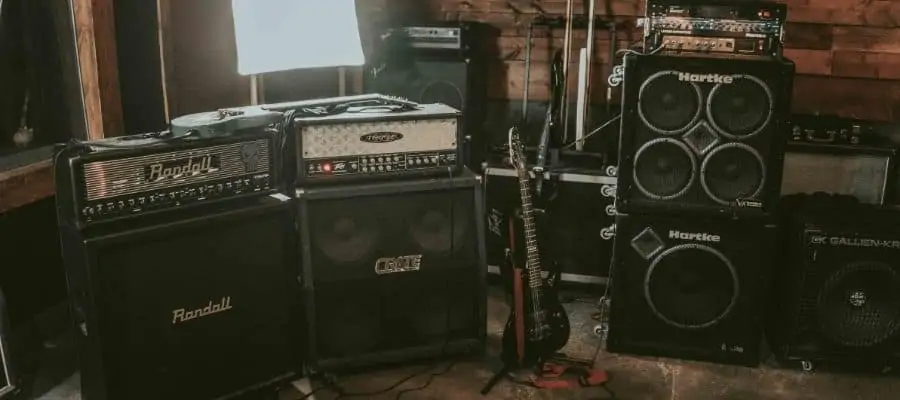
It’s not bad to play an electric guitar through bass amps. They are more powerful than guitar amps because they need to reproduce low frequencies coming from the bass guitar at an adequate volume.
Amps are actually electronic devices that turn the low voltage signals from the source into a signal that powers the speakers. Therefore, the lower the frequency to support, the more power required. Electric guitar notes sit in a higher register, so that requires less power, and that’s why a bass amp is not bad for an electric guitar – it can handle a guitar’s signal.
When it comes to the reverse situation – using a guitar amp for the bass guitar- it can be a real mess because the guitar amp can’t handle low-frequency signals.
Is A Bass Amp The Same As A Guitar Amp?
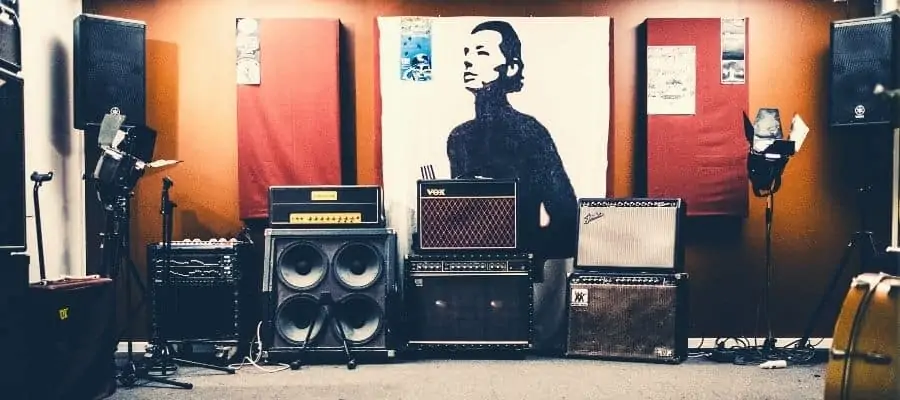
Both guitar and bass amp has the same role – increasing the voltage, current, or power of a signal. They both have a speaker cabinet and an amp head. But, there are some differences that make an amp adequate for a particular instrument.
A Frequency Response
Sound is a wave, and the human ear hears the sound if it has a frequency between 16Hz and 20kHz. Notes of the bass guitar sit in a low register, in the range of 31Hz-5kHz, and have long frequency waveforms that require more power to produce a clear sound from the speaker.
Electric guitar notes are in a higher register, with a frequency between 100Hz and 5kHz, and have shorter waveforms, so they require less power. So, the bass has a wider frequency response than an electric guitar. That means that the headroom (how far you can turn up an amplifier before the clean tone begins to distort) is pretty big. Everything is in service of handling lower frequencies.
Therefore, a bass amp responds even to lower frequencies coming from the bass, while guitar amps respond only to mid and high frequencies.
Wattage Requirement
Bass amps usually require more power to work because they need more energy to turn low voltage signals into a strong signal that can power speakers, so they require a high wattage supply in order to give the flawless sound output. As I said, the lower the frequency is, the larger frequency must be, and that conversion requires a lot of power. The typical wattage of guitar amps is 350W and more.
But, guitar amps have lower wattage requirements because they require less power to turn the mid or high – range signals into an audible sound. The typical wattage of guitar amps is between 10 to 120W, or a bit higher.
Speaker Size
Bass amp speakers have a different size than ones for guitar amps. Their size goes from 10 to 15 inches in diameter, and you can even see a speaker less than 10” in diameter as a part of bass amps used for practicing and small gigs. The guitar amp speaker size is 5 to 12 inches in diameter.
The difference in speaker size can be related to the previous points – bass amplifiers need bigger speakers as well as more power to transmit the sound because bass notes are lower-frequency ones, and it’s way harder to hear them, especially during live performances with the band. So, the larger the speaker, the more boom you hear in the sound. A guitar amp doesn’t need a high-diameter speaker because notes are higher. Speakers on a guitar amp have thin speaker membranes that color the sound.
As I said, smaller bass amps exist, and you can think it is a guitar amp unless you look closer. Logically, the smaller the bass amp is, the smaller the speaker is, and that is why it is not suitable for live performances. They are for practicing or small gigs because they are not loud enough. Some of them are the Orange Crush Bass 25 1×8”, Hartke HD15 1×6.5”, and Blackstar Fly 3 Bass 1×3”.
Can You Play Guitar Through A Bass Cabinet?
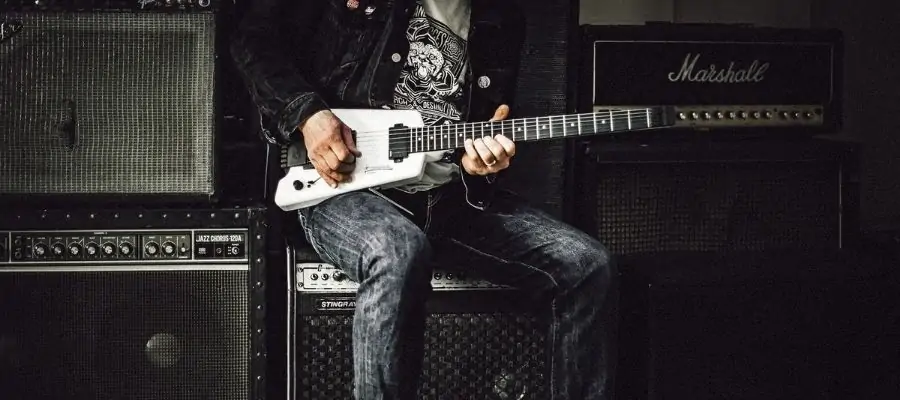
Yes, you can play guitar through a bass cabinet. The frequency response of the bass cabinet is in a range from a low 30Hz to a high 20kHz, which covers the mid and high-frequency guitar notes.
Speakers are also a big part of the sound of the amplifier. The frequent sizes of the speakers in the bass cab are 10” and 15”. If the bass cab has a 10”-12” speaker, it is good to translate mid and mid-high frequencies into the air.
So, for example, I would choose a 4×10 bass cab rather than one with a bigger speaker to have a more accurate guitar sound. It is almost impossible to define mids and highs adequately with bigger speakers, which are, on the other hand, necessary for bass players.
Is A Bass Amp Better Than The Electric Guitar Amp?
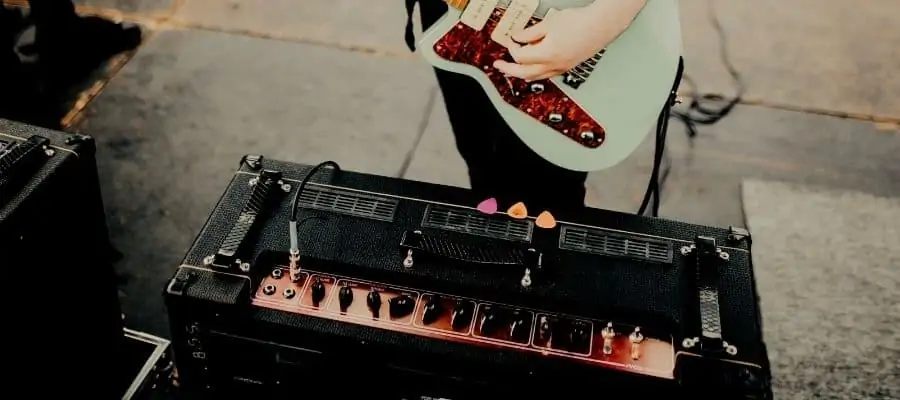
You can’t say in general if the bass amp is better than the electric one and vice-versa because, even though they have the same role, they are different in the power, frequency response, and speaker size.
One thing is sure – it’s all about the purpose. If you play bass, the bass amp is best for high-quality sound output and for translating low-frequency signals into the air. If you play an electric guitar, then for the very defined mids and highs, use the guitar amp.
Will I Get A Satisfying Sound Playing An Electric Guitar Through A Bass Amp?
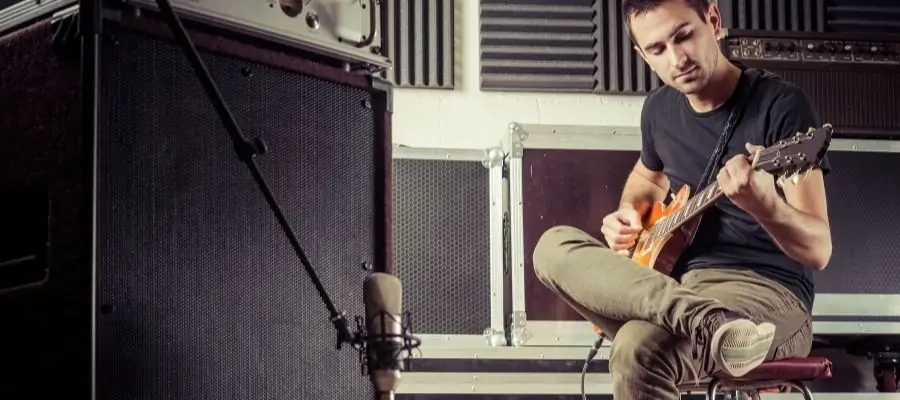
The guitar sound from the bass amp is not the same as from the guitar amp. There are some pros and cons when it comes to playing an electric guitar through a bass amp. Remember that the “satisfying sound” is a subjective thing – it all depends on what type of sound you want, so getting to know those pros and cons can answer this question.
Pros
First of all, the guitar sound from a bass amp has more depth, more low end, less distortion or overdrive, and that’s why it’s called a unique sound compared to a guitar sound generated from a guitar amp. And because of that, many well-known musicians use a bass amp for an electric guitar while playing or recording.
If you have a single-coil guitar pickup on your guitar, you probably deal with the lack of bass. To get rid of the “tinny” guitar sound, choose to play through the bass amp for a guaranteed bass frequency boost.
Cons
Bass amps usually don’t come with built-in effects that are useful for getting the rich guitar sound, so if you plug the guitar directly into the amp, you’ll get a monotonous and dry sound.
Also, as you increase the gain or volume of the guitar amp, the guitar signal is going to overdrive and distort, which is a big yes for guitarists. Bass amps can’t provide this – they amplify a sound with a little or no distortion at all.
So, playing an electric guitar through a bass amp can give you a unique and richer sound, but you should make some adjustments if you want the sound to be flawless.
How To Set A Bass Amp To Sound Good With An Electric Guitar?
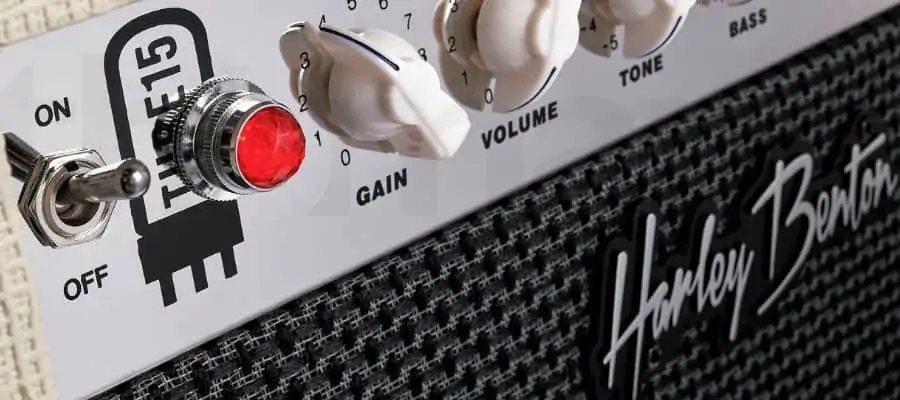
To run away from the monotonous electric guitar sound coming out of a bass amp, you should make some adjustments. The bad thing is that there’s no uniform setup because amps aren’t the same.
Tone Control
Bass amps are not for electric guitars, so if you want to connect these two, you have to spend some time adjusting the tone control settings with control knobs.
Some bass amps have two, and some of them have up to five tone-control knobs. Most bass amps give you control over the bass, mid-range, and treble frequencies to control the guitar sound.
An EQ Pedal
Using an EQ pedal is a way to gain more tone control. You can cut some frequencies and boost others at the same time, in order to make a guitar sound great even through the bass amp.
An Overdrive/Distortion Pedal
As I said, bass amps amplify a sound with not enough or no distortion. Also, they cannot give you an overdriven tone. It is not about the drawback – it is just because they are for bass.
So, to fix this problem while playing an electric guitar through a bass amp, you need an Overdrive or Distortion pedal. It will give you that „gritty” sound you usually get from a guitar amplifier.
Also, consider your playing genre when buying an Overdrive/Distortion pedal.
A Guitar Amp Modelers
Another way of running away from the guitar sound coming from a bass amplifier is using guitar amp modelers. They may not sound the same when you use them while playing through a bass amp, but they can be helpful to achieve the desired tone. You can use this method combined with tone control.
Which Bass Amp Is The Best For An Electric Guitar?
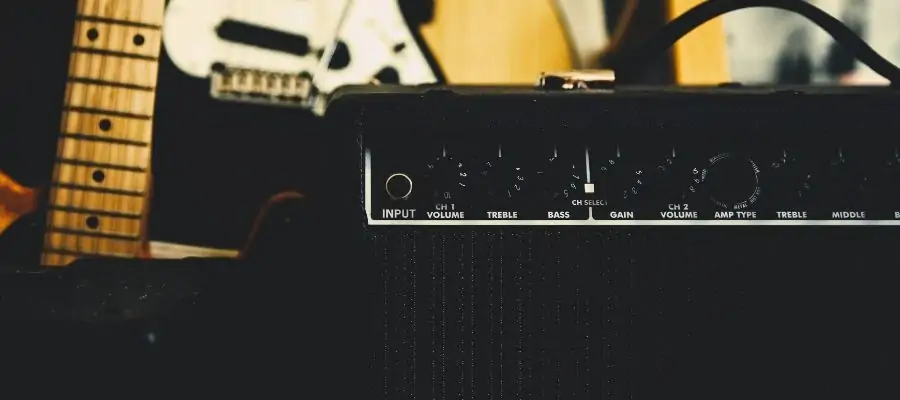
There are plenty of bass amps in all shapes and sizes. They are for a bass, but as I said before, it is possible to play an electric guitar through it, too. Some guitarists say that there is a difference between bass amps in the quality of guitar sound output. Many people mention the Fender Bassman as a “guitar-friendly” bass amp and many modern amps, such as SWR, Gallien Kruger, and so on.
Those bass amps are more preferred for an electric guitar than others for some guitarists because the final sound is satisfying for them. So, you pick the best bass amp for your electric guitar on your own because the choice depends on what guitar sound you want in the air, or better said, on your playing genre.
If you love the overdriven tone and distortion, adjusting a bass amp can give the desired sound. Also, some players say that a valve amp can give you a little bit of it, so it does its job, while a transistor amp can’t give you that. If you are more for jazz, blues, a clear sound coming out of the bass amp is way enough for you.
Will Playing An Electric Guitar Through A Bass Amp Cause Damage?
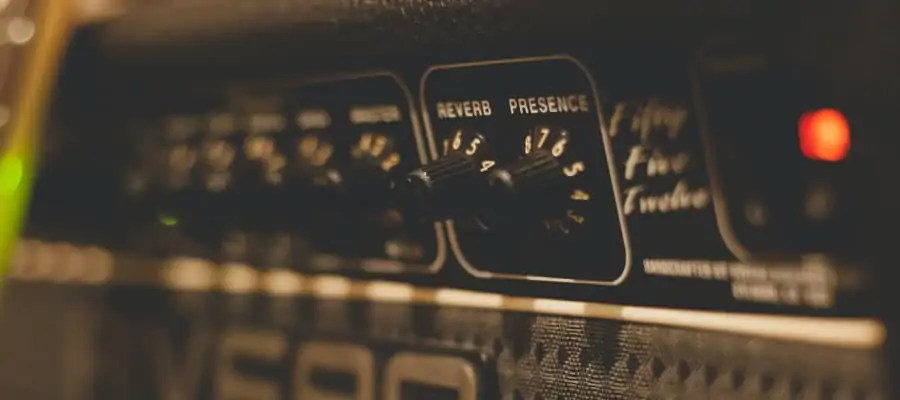
Playing an electric guitar through a bass amp will not cause any damage because the frequency response of a bass amp covers the mid and high-frequency guitar notes.
The high tones of a guitar are not capable of damaging your bass amp. Even if the amp is not suitable for higher tones, the amp is going to survive them. Speaker damage can be by either the cone moving too much or the voice coil overheating from distortion, but it is a rarity. The vice-versa is a worse idea because deep bass tones tend to be destructive to guitar amps.
Playing An Electric Guitar Through A PA System Or Bass Amp – What Is Better?
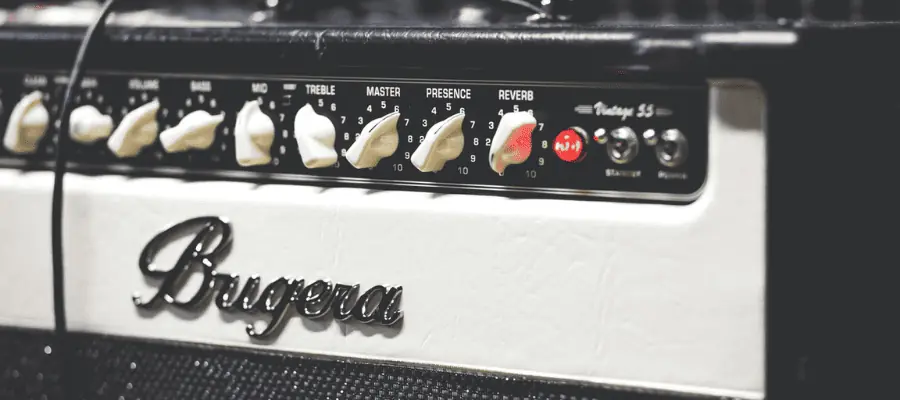
Some people think that using a PA system will louder an electric guitar signal and that the guitar sound will be way better. But, that is not true – you can only get low-quality guitar sound unless you connect it through an amp.
PA systems are similar to amps, but they work with any audio source, and they are not proper for just one specific type of sound. You can plug the guitar directly into a PA system, and your guitar will sound okay because the PA system has a wide range of frequency responses.
When it comes to the bass amps, they are for bass, but they can also be for playing an electric guitar with or without a setup, depending on the player’s needs.
So, between those two, always choose the bass amp because they create better electric guitar sound, even though they are not electric-guitar specific. You will get a clear and easy-to-control sound. If clearness is not compatible with your playing genre, you can always set a bass amp for the best possible results. And you can always connect the PA system to the amp to avoid less-controlled guitar sound.
Conclusion
Many people ask if the bass amp is suitable for an electric guitar-either because of the love for experimenting or the needs.
Amps are electronic devices that turn the low voltage signals from the source (instrument) into the signal that powers the speakers. The lower the frequency to support, the more power required. Guitar amps and bass amps are not the same things – there are some differences, such as wattage requirement, speaker size, and frequency response. Bass has low-frequency notes that require more power, while electric guitar notes sit in a higher register which requires less power. And because of that, playing guitar will not cause any damage.
Will the sound of an electric guitar coming out of the bass amp be pleasing to your ears or not depends on you and your affinities. If you’re more of a jazz, blues, and pop -person, you will love that clearness in a guitar sound. But, if you are more for the effects, overdriven sound, and distortion, then better use a guitar amp or make some setups on the bass one. You can do it by controlling the tune, using pedals (EQ, Distort, Overdrive), or maybe a guitar amp modeler. It is up to you – you choose what you want to hear.
So yes, it is possible to play an electric guitar through the bass amp. Some players have forgotten about guitar amps because they find some bass amps way better and perfect for producing a unique sound.
If you found this article useful you may want to save this pin below to your Guitar board
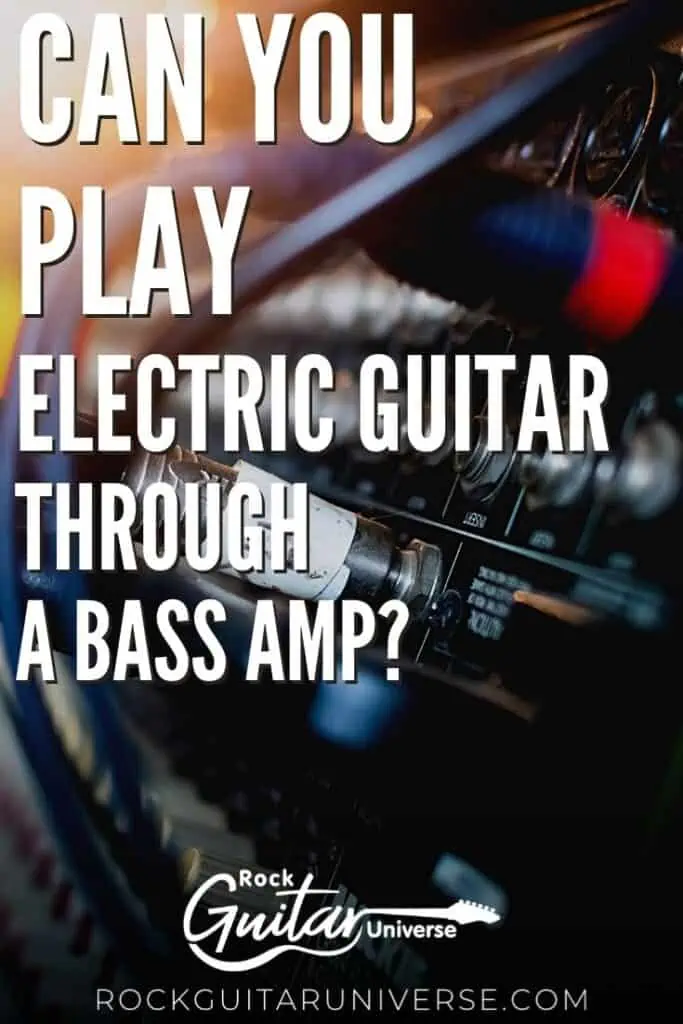
One thought on “Can You Play An Electric Guitar Through A Bass Amp?”
Leave a Reply
Recent Posts
When learning new songs have you noticed that some of the chord sequences sound really good? But when you tried to come up with your own chord sequence, or as we call it chord progression, you found...
Some guitarists insist on buying an expensive amplifier with their electric guitar. They assume that this is a must for every type of guitarist out there. However, in some situations, this isn’t...

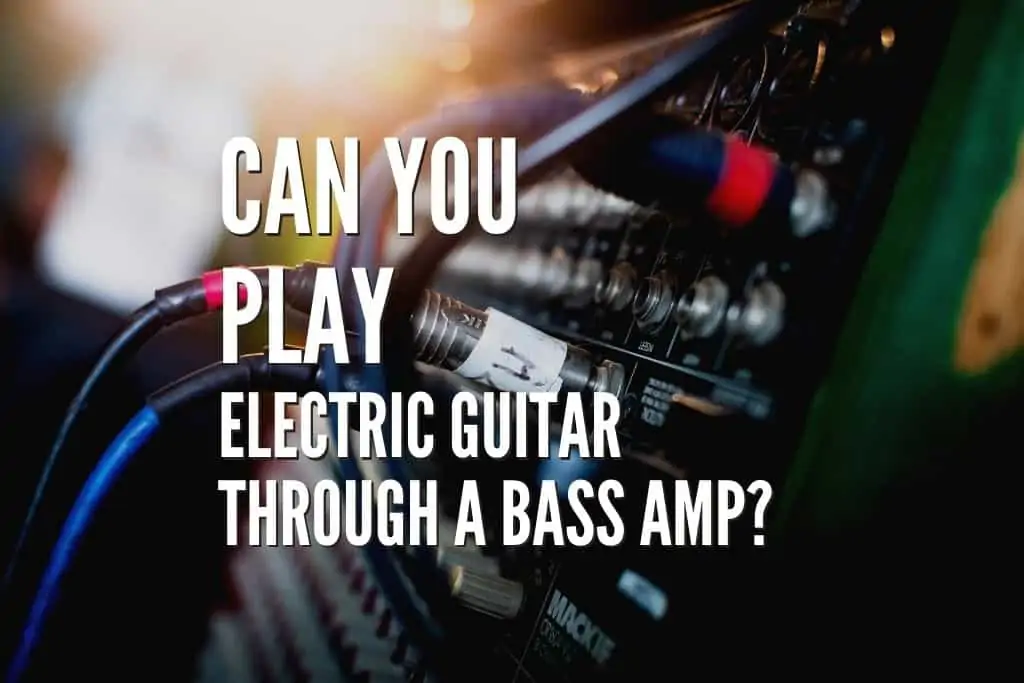
Idk how old is this, but thank you! I really don’t have the money to spend on a guitar amp but as I’m a bassist, it’s easy for me to repurpose the bass amp I have. I just didn’t want to damage it. One thing I’ve noticed so far in my experiments, is that if you use a multieffects board, make sure to have two sets–one for bass amp and one for let’s say, PA. If you use your effect designed for your bass amp in a PA system or a guitar amp, it will sound really bad essentially because your EQ will be very specific for your amp as the article says.